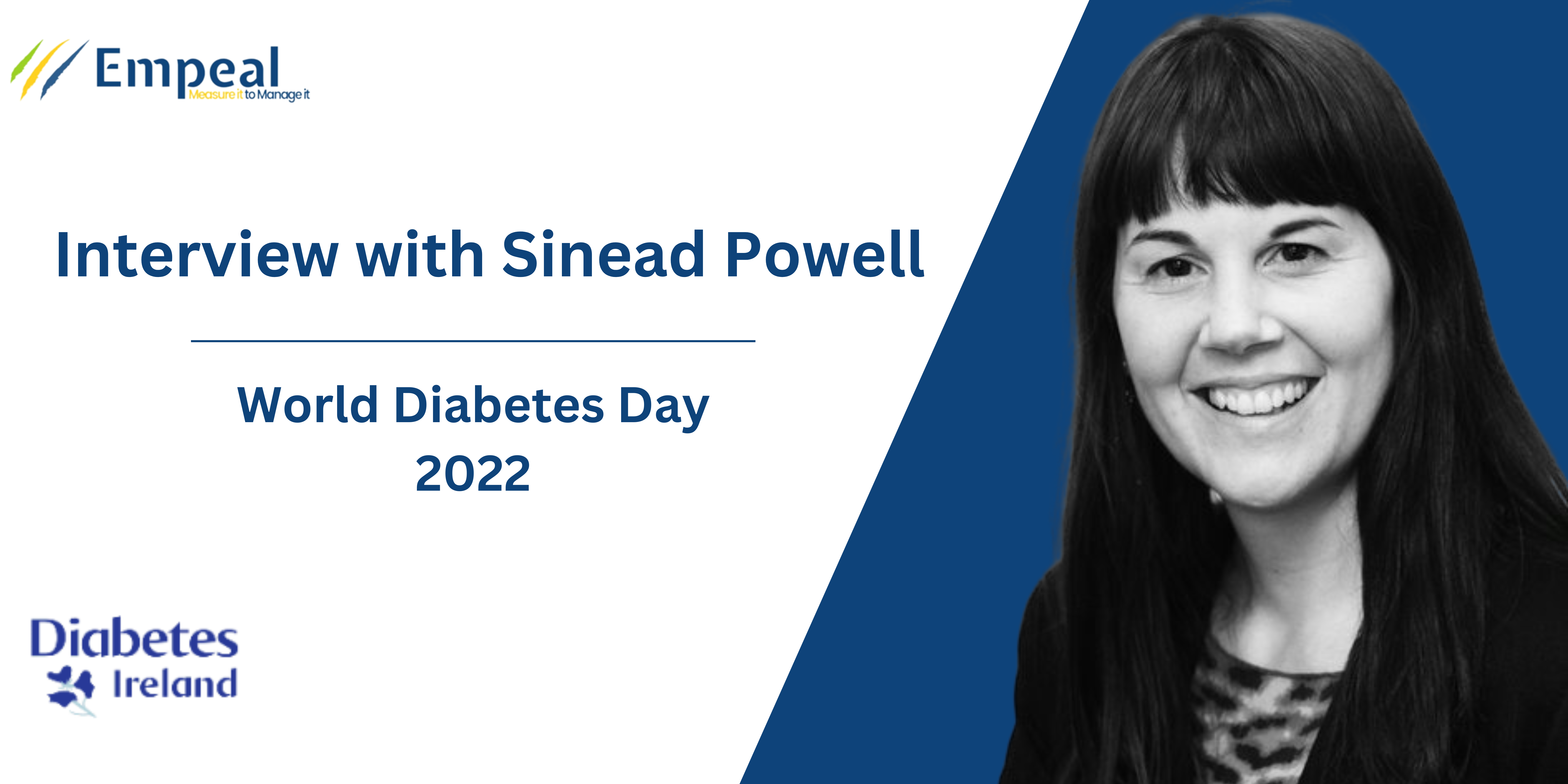Interview with Sinead Powell - Diabetes Ireland
 14 Nov, 2022
14 Nov, 2022
For this blog, we interviewed Sinead Powell to help raise awareness and educate others for World Diabetes Day. Sinead is a senior diabetes dietitian who has worked in the area of diabetes for over 25 years both in the UK and Ireland in secondary and primary care and for the last 15 years in the charity sector. Since joining Diabetes Ireland in 2007, Sinead has worked to develop diabetes services and raise diabetes awareness in the HSE North-eastern Region and nationally.
In this interview we focused on type 2 diabetes and the risks and complications that comes along with it. Type 2 diabetes is a lifelong condition that can be managed well by following a healthy lifestyle, taking medication, and with support and education from your diabetes healthcare team.
According to Sinead, “Type 1 Diabetes is less common as in many countries there would be a 10% prevalence. We estimate that there is 266,000 with diabetes in Ireland today”.
The onset of type 2 diabetes can be gradual, and symptoms can be mild during the early stages. As a result, many people may not realize that they have this condition. It is for this reason why we asked Sinead to explain this some more,
“Symptoms for type 1 diabetes often come on quite quickly for people. Some symptoms can include, thirst, tiredness, frequency of urination and weight loss. For those who are unaware, type 1 diabetes is an autoimmune condition and occurs when the body stops making insulin. The reasons for this are still unknown and research in ongoing”.
“It is highly important to be more aware of the risk factors of type 2 diabetes as people often do not experience warning signs and it can take up to 12 years to develop. Typically, individuals will only have diabetes symptoms if blood glucose levels rise above 14 or 15. A person who does not have diabetes has blood glucose levels between 4 and 7. For those who have type 2 or prediabetes, blood glucose levels can be above this range and unless they are more than 15mmols/l they may feel fine. The risk here is that often individuals don’t feel any different, but blood glucose levels out of range can cause damage to the blood vessels.
Sinead outlined some risk factors of type 2 diabetes to look out for, particularly for individuals aged over forty.
- If you have family history with diabetes
- If you are overweight
- Having had gestational diabetes previously
- Having to take steroids
- Having high blood pressure
- Having high cholesterol
- Having high stress levels
- Not exercising regularly
When it comes to type 2 diabetes we were curious to investigate to see how manageable the condition is for individuals as research indicates that many are left to do manage the condition alone. When Sinead was proposed with this question she agreed,
“Yes I would agree with that. Type 2 diabetes can be more self-managed, and individuals are encouraged to educate themselves on this.We try to empower people to seek help and advise when it comes to learning more about their condition o help them find ways of managing it”.
Type 2 diabetes is widely researched, and many resources indicate that individuals can use lifestyle interventions to put diabetes into remission. When asked about remission, Sinead informed us that.
“If people are able to reduce fat mass around their liver and pancreas they have the possibility of improving insulin sensitivity. This is one way in which individuals with type 2 diabetes can reduce their blood glucose levels to a point where they are not classified to have diabetes anymore. However, this does not mean it cannot come back and that is why regular checks are important.
Change isn’t easy and that is why seeking a support team is essential to the improvement of your health. Some key areas to focus on are, maintaining a healthy diet, exercising regularly, aiming for a healthy weight, taking prescribed medications, and checking your blood glucose levels if told to do so”.
Seeking the right support at the right time is critical in managing any chronic illness. We acknowledge that making lifestyle changes can be challenging and slow process at times, however the proven benefits to making these changes cannot be argued with. Maintaining a healthy diet, managing stress, and exercising regularly can significantly impact your overall wellbeing and health. It can be hard to reach your health and wellness goals on your own and that is why reaching out for further education and support is important.
To gain additional resources you can utilise information from the Diabetes Ireland website which holds education resources and online courses such as CODE and Diabetes Smart for individuals diagnosed with type 2 diabetes. These are online and free to attend.
Find link HERE

How Healthy are You?
Get a picture of your current health status and habits by taking our short Health and Wellbeing Check!